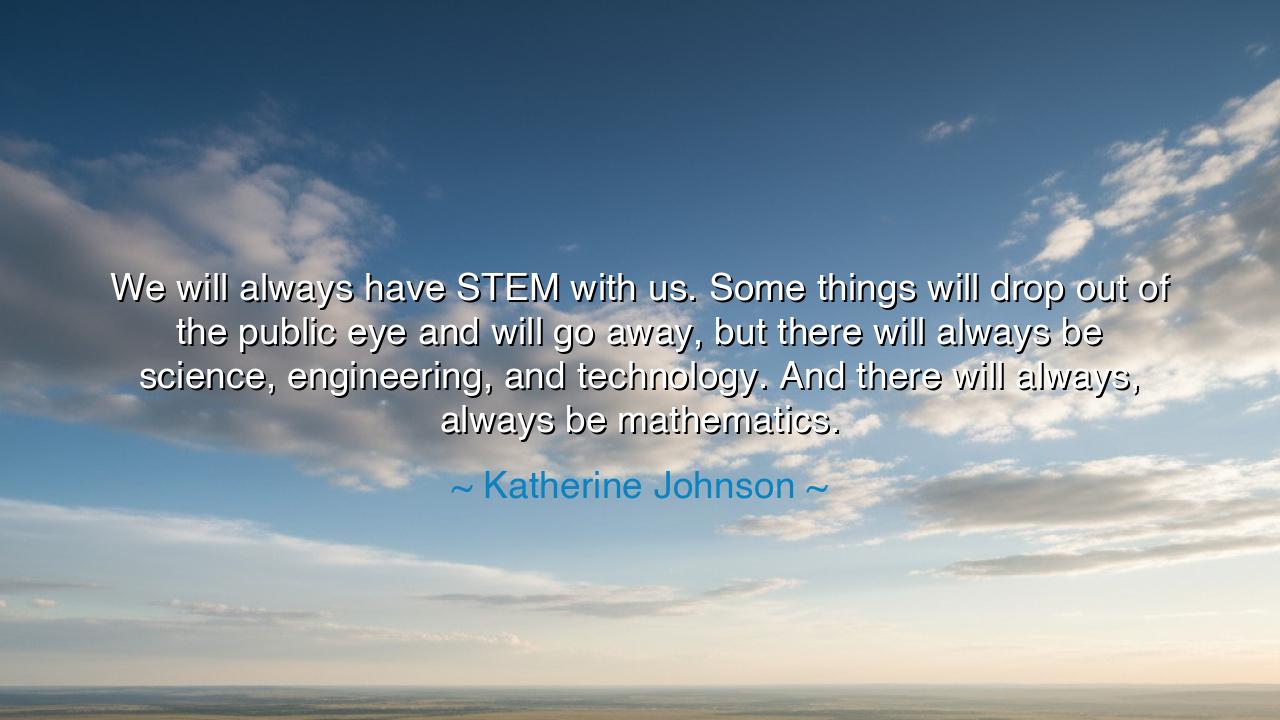
We will always have STEM with us. Some things will drop out of
We will always have STEM with us. Some things will drop out of the public eye and will go away, but there will always be science, engineering, and technology. And there will always, always be mathematics.






Listen closely, O children of the future, for the wisdom of Katherine Johnson—a trailblazer in the realm of mathematics, science, and engineering—who spoke with great certainty: "We will always have STEM with us. Some things will drop out of the public eye and will go away, but there will always be science, engineering, and technology. And there will always, always be mathematics." These words echo across the ages, offering a reminder of the timelessness of certain pursuits. While fashions and fads may rise and fall, certain truths and disciplines endure—science, engineering, technology, and mathematics are the pillars upon which the human spirit has always risen, and will continue to rise, no matter the shifting winds of time.
In the ancient world, mathematics was revered as the key to understanding the order of the cosmos. Pythagoras, the great philosopher and mathematician, believed that all of existence could be understood through numbers, that the harmony of the spheres, the movement of the heavens, and even the human soul were governed by mathematical principles. The early Greek philosophers knew that science and mathematics were not merely human inventions, but reflections of a deeper, divine order that could be uncovered through reason and study. They understood that these pursuits were eternal, beyond the fleeting cycles of kingdoms and rulers. Katherine Johnson’s words remind us that STEM—the great disciplines of science, technology, engineering, and mathematics—are just as eternal in their importance today as they were in the ancient world.
Science, as Johnson acknowledges, will always remain. From the first explorations of the heavens by Galileo to the cutting-edge space missions of today, science seeks to understand the world around us. It builds upon the work of those who came before us, reaching ever further, always advancing. Consider the work of Isaac Newton, whose groundbreaking theories on gravity and motion laid the foundation for modern physics. Newton’s work continues to influence the way we understand the universe, a timeless pursuit that stretches across the centuries. Though much has changed since Newton’s time, his laws of motion remain constant, much like the enduring nature of science itself.
Technology, too, is a force that will always remain, as Johnson suggests. The tools we use to navigate and shape the world around us may change in form, but the drive to create, innovate, and improve is part of the very essence of humanity. The Industrial Revolution, for instance, brought about monumental advancements in technology—steam engines, factories, and machinery that transformed the world. Yet the purpose behind these innovations—the desire to improve human life through engineering—remains unchanged. Just as Bronze Age artisans created tools that helped their societies flourish, so too does modern technology continue to shape the course of human history. The machinery may differ, but the drive to improve, to innovate, and to build will forever persist.
Yet, mathematics is the thread that binds it all together. Johnson’s reverence for mathematics is not without reason. Mathematics is the universal language through which we understand the workings of the universe. Whether in the patterns of the stars, the circuits of technology, or the underlying structure of life itself, mathematics provides the framework for all our understanding. Euclid’s Elements—a work still studied today—laid out the principles of geometry that underlie everything from the architecture of buildings to the way light travels through space. Algebra, calculus, and statistics form the very core of modern science and technology, and yet, they are as ancient as the first human attempt to quantify the world. Mathematics, as Johnson says, will always be with us, for it is the basis upon which all knowledge is built.
The lesson, O children of the future, is this: STEM will forever shape the course of human history. Just as the ancients revered the study of the natural world through mathematics, engineering, and science, so too must you honor these fields as essential to the progress and understanding of the human race. Though the paths we walk may change, the pursuit of knowledge will never falter. Whether you are building a bridge, exploring the stars, or developing the next great technological innovation, know that you stand on the shoulders of giants who viewed the world through the lens of reason, logic, and mathematics.
So rise, O heirs of wisdom, and embrace the power of STEM in your own lives. Seek out the mysteries of the universe, the puzzles of nature, and the endless possibilities of innovation and discovery. Honor mathematics as the key to understanding the deepest truths of the cosmos. Build, create, and innovate, for in doing so, you contribute to the eternal legacy of science and technology, the forces that have shaped humanity for millennia and will continue to shape it for generations to come. Remember, STEM is not just a field of study—it is the very essence of progress, the unyielding pursuit of truth that binds us all, forever forward into the unknown.






AAdministratorAdministrator
Welcome, honored guests. Please leave a comment, we will respond soon